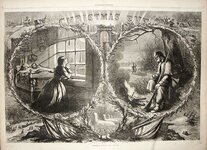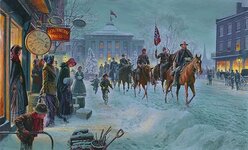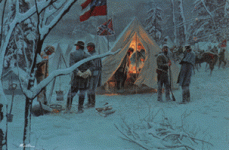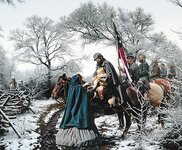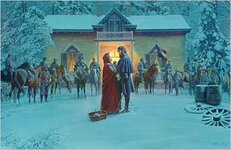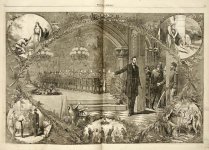Gypsy Heart
Gold Member
"Ought it not be a Merry Christmas?
Even with all the sorrow that hangs, and will forever hang, over so many households; even while war still rages; even while there are serious questions yet to be settled - ought it not to be, and is it not, a merry Christmas?"
Harper's Weekly, December 26, 1863
Dec 27th 1864
Camp 4th Del Vol 3 Brg 2 Dev 3 Corps
Dear wife I will send you a few lines stating how we are I have bin down with the diarier for about a weak it has bin the most sevear that I hav ever ha but I feel better to day & I hav washed all of my cloaths & I borrowed some cloathes while mine are drying I cant write you mutch this time but if I keep wel I will try and write you a interesting leter some of those days we hav got houses built up wonce more but Christmas was a very dul day hear we have not had it yet but the war news is good we have had a despatch from G Shairman he has done more than we could of asked of him I hope this will find you all wel Samey is not very wel he had a cold we hav bin very mutch exposed but I dont want to write about You can sea the reason why I hav not wrote I send my love to all from you ever true and loving Husband
Levi McCormick
good by
send on your box
Jim sais we will have some soope
Excerpts from several letters I found online in reference to Christmas. The source websites are listed at the end.
On December 24, 1861, Captain Robert Goldthwaite Carter of the 22nd Mass. Vol. Inf. 4th U.S. Cavalry wrote:
"Christmas Eve, and I am on duty as officer of the day, but I am not on duty to-morrow. As much as I desire to see you all, I would not leave my company alone... ...I give my company a Christmas dinner to-morrow, consisting of turkey, oysters, pies, apples, etc.; no liquors."
* * * * *
On December 25, 1864, J. C. Williams, 14th Vermont Infantry
"This is Christmas, and my mind wanders back to that home made lonesome by my absence, while far away from the peace and quietude of civil life to undergo the hardships of camp, and may be the battlefield. I think of the many lives that are endangered, and hope that the time will soon come when peace, with its innumerable blessings, shall once more restore our country to happiness and prosperity."
* * * * *
John H. Brinton, a Major and Surgeon U.S.V. wrote:
"[1861] During the days preceding Christmas, I received some boxes from home, full of nice comfortable things, and the letter which came to me at that time, you may be sure, made me feel homesick. On Christmas night, I left for St. Louis as my teeth were troubling me, and greatly in need of the services of a dentist. I was fortunate in finding a good one, and in a day or two the necessary repairs were made."
* * * * *
From the Diary of An Enlisted Man, by Lawrence VanAlstyne
2nd Lieutenant, 90th United Sates Colored Infantry
December 24, 1863
"As to-morrow is Christmas we went out and made such purchases of good things as our purses would allow, and these we turned over to George and Henry, for safe keeping and for cooking on the morrow."
* * * * *
From the diary of Private Robert A. Moore, a Confederate soldier.
Tuesday, Dec 24th, 1861, camp near Swan's.
"This is Christmas Eve but seems but little like it to me"
Wednesday, Dec. 25th, 1861, camp near Swan's.
"This is Christmas & and very dull Christmas it has been to me. Had an egg-nog to-night but did not enjoy it much as we had no ladies to share it with us."
* * * * *
From the diary of Robert Watson of Key West, Florida.
December 25, 1862 in Tampa, FL as an orderly sergeant of Co. K, 7th Florida Regt.
"Christmas day and I was in bed all day from chills and fever. I ate nothing and as there is no liquor in the place of course I drank nothing."
December 25, 1863 at Dalton, Georgia after action at Chickamauga
"Christmas day and a very dull one but I find a tolerable good dinner. I had one drink of whiskey in the morning. There was some serenading last night but I took no part in it for I did not feel merry as my thoughts were of home..."
December 25, 1864 at Charleston, S.C. following his transfer to the Navy
"Christmas day. Turned out at 6 AM, very cold. We were ordered to hold ourselves in readiness to leave at moments warning... ...This ends Christmas day. The poorest I ever spent."
* * * * *
In a letter to his sister Anna Simpson, Tally Simpson wrote:
Dec. 25th
My dear sister,
"This is Christmas Day. The sun shines feeble through a thin cloud, the air is mild and pleasant, a gentle breeze is making music through the leaves of the lofty pines that stand near our bivouac. All is quiet and still and that very stillness recalls some sad and painful thoughts. The day, one year ago, how many thousand families, gay and joyous, celebrating Merry Christmas, drinking health to absent members of their family and sending upon the wings of love and affection long, deep, and sincere wishes for their safe return to the loving ones at home, but today are clad in the deepest mourning in memory to some lost and loved member of their circle..."
"When will this war end? Will another Christmas roll around and find us all wintering in camp? Oh! That peace may soon be restored to our young but dearly beloved country and that we may all meet again in happiness."
* * * * *
From the Civil War diary of General Josiah Gorgas - 1864:
"December 26th A despondent Christmas has just passed, yet people contrived to eat hearty and good Christmas dinners. The soldier unfortunately have not even meat, and have had none for several days. The Commissary General has singlely failed in his duties; while there is plenty of food in Georgia there is none here. There is no sufficient excuse for this. The food must be brought here, and the means to so provided and organized
Even with all the sorrow that hangs, and will forever hang, over so many households; even while war still rages; even while there are serious questions yet to be settled - ought it not to be, and is it not, a merry Christmas?"
Harper's Weekly, December 26, 1863
Dec 27th 1864
Camp 4th Del Vol 3 Brg 2 Dev 3 Corps
Dear wife I will send you a few lines stating how we are I have bin down with the diarier for about a weak it has bin the most sevear that I hav ever ha but I feel better to day & I hav washed all of my cloaths & I borrowed some cloathes while mine are drying I cant write you mutch this time but if I keep wel I will try and write you a interesting leter some of those days we hav got houses built up wonce more but Christmas was a very dul day hear we have not had it yet but the war news is good we have had a despatch from G Shairman he has done more than we could of asked of him I hope this will find you all wel Samey is not very wel he had a cold we hav bin very mutch exposed but I dont want to write about You can sea the reason why I hav not wrote I send my love to all from you ever true and loving Husband
Levi McCormick
good by
send on your box
Jim sais we will have some soope
Excerpts from several letters I found online in reference to Christmas. The source websites are listed at the end.
On December 24, 1861, Captain Robert Goldthwaite Carter of the 22nd Mass. Vol. Inf. 4th U.S. Cavalry wrote:
"Christmas Eve, and I am on duty as officer of the day, but I am not on duty to-morrow. As much as I desire to see you all, I would not leave my company alone... ...I give my company a Christmas dinner to-morrow, consisting of turkey, oysters, pies, apples, etc.; no liquors."
* * * * *
On December 25, 1864, J. C. Williams, 14th Vermont Infantry
"This is Christmas, and my mind wanders back to that home made lonesome by my absence, while far away from the peace and quietude of civil life to undergo the hardships of camp, and may be the battlefield. I think of the many lives that are endangered, and hope that the time will soon come when peace, with its innumerable blessings, shall once more restore our country to happiness and prosperity."
* * * * *
John H. Brinton, a Major and Surgeon U.S.V. wrote:
"[1861] During the days preceding Christmas, I received some boxes from home, full of nice comfortable things, and the letter which came to me at that time, you may be sure, made me feel homesick. On Christmas night, I left for St. Louis as my teeth were troubling me, and greatly in need of the services of a dentist. I was fortunate in finding a good one, and in a day or two the necessary repairs were made."
* * * * *
From the Diary of An Enlisted Man, by Lawrence VanAlstyne
2nd Lieutenant, 90th United Sates Colored Infantry
December 24, 1863
"As to-morrow is Christmas we went out and made such purchases of good things as our purses would allow, and these we turned over to George and Henry, for safe keeping and for cooking on the morrow."
* * * * *
From the diary of Private Robert A. Moore, a Confederate soldier.
Tuesday, Dec 24th, 1861, camp near Swan's.
"This is Christmas Eve but seems but little like it to me"
Wednesday, Dec. 25th, 1861, camp near Swan's.
"This is Christmas & and very dull Christmas it has been to me. Had an egg-nog to-night but did not enjoy it much as we had no ladies to share it with us."
* * * * *
From the diary of Robert Watson of Key West, Florida.
December 25, 1862 in Tampa, FL as an orderly sergeant of Co. K, 7th Florida Regt.
"Christmas day and I was in bed all day from chills and fever. I ate nothing and as there is no liquor in the place of course I drank nothing."
December 25, 1863 at Dalton, Georgia after action at Chickamauga
"Christmas day and a very dull one but I find a tolerable good dinner. I had one drink of whiskey in the morning. There was some serenading last night but I took no part in it for I did not feel merry as my thoughts were of home..."
December 25, 1864 at Charleston, S.C. following his transfer to the Navy
"Christmas day. Turned out at 6 AM, very cold. We were ordered to hold ourselves in readiness to leave at moments warning... ...This ends Christmas day. The poorest I ever spent."
* * * * *
In a letter to his sister Anna Simpson, Tally Simpson wrote:
Dec. 25th
My dear sister,
"This is Christmas Day. The sun shines feeble through a thin cloud, the air is mild and pleasant, a gentle breeze is making music through the leaves of the lofty pines that stand near our bivouac. All is quiet and still and that very stillness recalls some sad and painful thoughts. The day, one year ago, how many thousand families, gay and joyous, celebrating Merry Christmas, drinking health to absent members of their family and sending upon the wings of love and affection long, deep, and sincere wishes for their safe return to the loving ones at home, but today are clad in the deepest mourning in memory to some lost and loved member of their circle..."
"When will this war end? Will another Christmas roll around and find us all wintering in camp? Oh! That peace may soon be restored to our young but dearly beloved country and that we may all meet again in happiness."
* * * * *
From the Civil War diary of General Josiah Gorgas - 1864:
"December 26th A despondent Christmas has just passed, yet people contrived to eat hearty and good Christmas dinners. The soldier unfortunately have not even meat, and have had none for several days. The Commissary General has singlely failed in his duties; while there is plenty of food in Georgia there is none here. There is no sufficient excuse for this. The food must be brought here, and the means to so provided and organized
Attachments
Upvote
0


